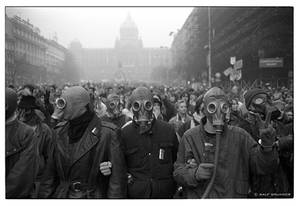“It’s the little details that are vital. Little things make big things happen.”
John Wooden
Hi all,
The Mouselemur thought, since I’ve started writing journals exactly two years ago, it would be fun to change up the topics. No more talk about my schoolwork – I’ve especially translated an essay the Mouselemur wrote in Dutch, to English so you can all understand.
It was written for the course “Legal English”, and was supposed to be an opinionated essay on Human Rights based on a number of judicial sources. The result you’ll be able to read for your pleasure, in this memorial journal.
I hope you’re able to understand it all – sometimes it sounds better in Dutch, so I hope it comes across right. Feel free to comment – they’re much appreciated, as you ought to know by now ![]() What do you think about human rights, what did you think about the essay, and were you able to understand anything written or did you drop out after the first paragraph?
What do you think about human rights, what did you think about the essay, and were you able to understand anything written or did you drop out after the first paragraph?
I’ve looked for accompanying photos who I feel serve as an extra in the essay –and will at least make the journal a bit fun to scroll through if you don’t feel like reading it ![]()
DIFFERENCES LIE IN CROOKS AND CRANNIES
Shortly after signing the peace treaty that meant the end of the Second World War, the Universal Declaration of Human Rights (UDHR) came about.This declares a number of universally applicable rights for all humans. However, ever since it was adopted, controversy has rained concerning the contents of the UDHR. Several countries feel the UDHR does not accommodate cultural differences which can lead to different interpretations of Human Rights. The point of view defended in this essay is, that Human Rights do exist and are universal, but adaptations need to be made in its execution, in an attempt to appease the unease in the international society about Human Rights.
The existence of Human Rights
Before divulging into a better arrangement concerning Human Rights, first must be established what is meant by Human Rights.
In it’s most simple definitions, Human Rights are the rights codified in the UDHR and other international treaties that accomplish general rights for humans. An important aspect on the UDHR is that the treaty in itself does not have direct effect; citizens can not appeal to it directly. Other United Nations treaties do have direct effect, and give citizens the possibility to file a complaint at the UN, when they strongly feel their Human Rights are being violated. 
There’s a differentiation made between the Human Rights created over the years. These exist of social and economical Human Rights, and political and civil rights. These are further specified in other treaties, beside the UDHR, which only emphasizes the differentiation. It are mostly western countries who emphasize the political and civil rights, placing the emphasis especially on the importance of the individual and the human being who needs to experiences as much freedom as possible. On the other hand are the countries with a more collectivist approach, and often less prosperous, emphasizing social and economical Human Rights, and attach more importance to satisfying the primal needs.


When treaties attempt to define Human Rights, this definition often quickly turns abstract and starts leaning towards the reigning situation in the western countries. This complaint from many non-western countries has been expanded with their opinion of the current design of Human Rights not befitting their culture and way of life.
To bridge this conflict, there are experts who think Human Rights are best defined as a human value man’s own. In principle, Human Rights should be defined in the light of the moral insight every human being possesses.
This moral insight, which is man’s own because they are reasonable creatures and from this reason rises moral truths, from which Human Rights stem. By arguing that all humans have this reason in common, you can not state this stems from a culture, because it is man’s own.
But if humans have a moral truth in common, how could it be possible that humans, from their existence on till the moment they decided it could no longer continue the way it has, have always violated Human Rights and have never stopped this? Every country has its own interpretation of the execution – which also means that in some cases, there is no execution of it at all – of Human Rights. This would, in the case of a mutual idea of right and wrong, not be possible.
Universal or uniform
When Human Rights are universal, this ought to mean that Human Rights apply everywhere in the world, and are thus the same everywhere. Considering the newspaper headlines and reports that reach us every day, it is possible to suppose, this is not the case. An important question in this matter is whether Human Rights could possibly be universal at all.
All countries have at least signed one treaty in which they acknowledge Human Rights. However, reservations can be made on the treaties that define Human Rights, and as mentioned before, the UDHR does not have direct effect. For this reason there are several countries who appeal to their culture and local customs and habits, to prove Human Rights are in fact, not universal. They wish to be given the possibility to interpret Human Rights on a national level, in a way more conform their lifestyle.
When people talk about the “universality of Human Rights”, this usually merely comes down to a worldwide, uniform application of Human Rights; after all, they can only be acknowledged when they apply everywhere the same way. Considering the before mentioned reality, this does not work. There’s a theory that countries are more wont to live up to Human Rights when they’re given the opportunity to interpret them on a national level. To make this possible, there needs to be a general framework on international level to supply the interpretation with a basis.

The Council of Europe has already been executing this within the European Declaration of Human Rights and Fundamental Freedoms (EDHR). They’ve put a “margin of appreciation” within their jurisprudence, lending national legislators a certain degree of freedom in regards to their application of the EDHR on national level. States who sign this treaty, need to have an underscoring, common cultural and moral basis, to be able to successfully act on this treaty. Within the UN, countries are also giving a certain measure of freedom to further define concepts on a national level, beside a general framework that has been shaped internationally. Countries will retain this freedom as long as the national arrangements don’t clash with the UN framework decision.
This manner of codifying could mean a better support for Human Rights, but could also lead to large differences. When one takes care to internationally establish the center of the to be determined rights, the more specific details will be further determined on national level.
Once it is ascertained that Human Rights do in fact exist, and should be executed universally, what possibilities does a country have, when it does not act on the rules the international community or he himself, has established?
Enforcement of Human Rights
The United Nations have created the UDHR to show their interest in Human Rights; it is only logical if they’d had designed an enforcement system for Human Rights. Several committees have been appointed to investigate and report on Human Rights, but they do not have an actual enforcing power. When one feels the need to intervene in a desolate situation, the execution of this is dependent of the General Assembly or the Security Council.
Many countries in the Security Council possess the right to veto, and can easily deflect an intervention in their own country. Aside from this, both the General Assembly and the Security Council are notoriously marred by severe nepotism; there’s been an intervention in several countries, while the abuses in others are purposely ignored. Politics influence the manner of enforcement of Human Rights.
Both inside and outside the UN exist a number of treaties aside from the UDHR, to define and protect Human Rights. Generally, agencies have been created within these treaties, who serve only as advisors, observers and reporters concerning the wildly specific area they were designed for. They do not have enforcement powers and can not force countries to stick to their advice and recommendations.
There are also non-governmental organization who independently research Human Rights. They are less bound to politics in their reports, but they to do not have the power to intervene. They do possess the possibility to offer their reports to organizations with more power, in the hopes of instigating an intervention. They also have the choice to search for publicity for their reports, to draw international attention to the violation of Human Rights. This could then lead to an improvement of the accused country; they may choose to practice sustainable changes to make the negative publicity go away.
As long as the duty to intervene does not exist within enforcement agencies of the UN or other international organizations, an intervention will only take place when this does not conflict with – most often economical – interest of the countries that decide whether to intervene.
If countries themselves are addressed on the violation of Human Rights, and they are demanded to adjust the internal policies, these countries will call upon their sovereignty and won’t listen to the demand to make adjustments. The excuse of the sovereign state is often used in the debate on Human Rights, when countries are confronted with the violation of Human Rights on their own soil. Their reasoning is oft that this is part of national politics and the international community shouldn’t meddle overly much.
Warrant your rights
From different studies perspectives, it is safe to say that Human Rights do exist, and are universal. At this moment, however, there are no existing effective ways to enforce Human Rights. The agencies qualified to intervene are politically marred and will only intervene when their own interests won’t be harmed or are already protected. On the opposite side are agencies who aren’t politically marred, yet aren’t qualified to intervene and can only write reports the majority will lay aside without having read it and with no intention to act on it.
If we make it possible for Human Rights to be internationally protected, we need to invent a ways that will force and ascertain countries will adjust their internal policies to warrant Human Rights. This can in no way detract from the sovereignty of states. It’s a difficult matter, and it will not be easy to persuade countries to hand over a large part of their independence and internal policies to an internal agency.
But nothing has ever gone lost by at least trying.
“Enjoy the little things, for one day you may look back and realize they were the big things.”
Robert Brault
I hope you enjoyed reading this ![]() We certainly enjoyed writing both parts of it
We certainly enjoyed writing both parts of it ![]()
As always, with lots of love,
Mouselemur & Me ![]()













